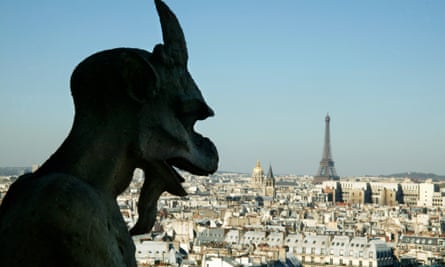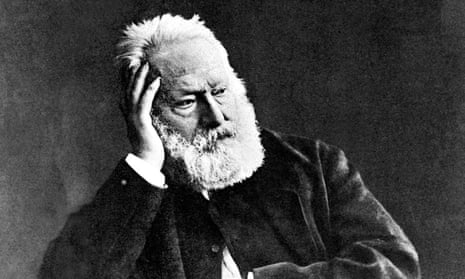Victor Hugo is rightly remembered for his amazing literary output, and for his philanthropic work as a member of France’s National Assembly, campaigning for an end to poverty, free education for all children and the abolition of the death penalty. But he was also incredibly eccentric and libidinous, with a penchant for writing while starkers, and armed with a party trick – swallowing oranges whole.
The BBC remake of Les Misérables seeks to upturn what we think we know about the story, looking beyond the musical to the pages of the novel it came from. But what if we take a step further, looking beyond the pages to the man behind them? The stripped back (in more ways than one) Hugo is far more interesting than he’s given credit for.

There’s a monument marking the exact spot where Hugo was conceived
On France’s Mont Donon, you can enjoy spectacular vistas across the borders of France, Germany and Switzerland. But in May 1801, Major Hugo and his wife were not paying much attention to the view – and in the 1960s, a museum curator decided to mark the spot where Hugo was conceived with an engraved sandstone block.
Hugo (always the storyteller) added his own embellishments: the Celtic sanctuary on the summit became a Roman temple of love and the obscure mountain was transformed into the much more glamorous (and 3,000 ft taller) Mont Blanc. He also claimed that his mother was a half-wild Amazonian (she was born in Nantes).
Hugo was probably the 19th-century’s most prolific sex addict
Hugo’s insistent retellings of the story of his own conception might be explained by the fact that the guy was obsessed with sex. He claimed that on their wedding night he and his wife Adèle Foucher had sex nine times. Foucher reportedly lost interest in intercourse altogether – but 19th-century Paris had enough brothels to keep Hugo entertained morning, evening and night. Venerated as a saint (albeit only in the Vietnamese religion of Cao Dai), when Hugo died the brothels of Paris closed down for a day of mourning, allowing all the city’s sex workers to pay their last respects to a loyal client. Literary critic Edmond de Goncourt claimed a police officer told him that sex workers even draped their genitals in black crepe as a mark of respect.
He loved a party …
For much of his life, Hugo reportedly hosted around 30 guests for dinner every night. His party trick was to shove an entire orange in his mouth then fill his cheeks with as many lumps of sugar as possible. He’d then churn it all up in his mouth and glug down two glasses of kirsch before swallowing the lot. Neat.
In his spirit, even Hugo’s funeral turned into a party; urban legend has it that Paris experienced a mini baby boom nine months later.
… but he loved fame even more
It’s probably quite difficult not to let your ego inflate when you’re so famous that the street you live on is renamed after you – Hugo spent his last few years on Avenue Victor Hugo, having letters addressed to him as “Mr Victor, in his avenue, Paris”. Prior to that, Hugo lived for 15 years on the Channel Island of Guernsey, where he wrote poetry and the majority of Les Misérables. He was so well-known even there that fans would take home pebbles that he had stepped on as mementos.
At his dinner parties, Hugo would list the reasons why he was superior to Balzac, Racine and while he was at it, all other French writers. (The orange trick may have been secretly devised by guests as a way to get him to shut up.) And in 1881, in celebration of his entering his 80th year, a national holiday was decreed, all school punishments were lifted and Hugo sat and waved at a procession of 600,000 people as they wandered past his front door.
The champion of the poor and miserable was never poor and miserable
When negotiating payment with his publisher for Les Misérables, Hugo famously declared that he wanted to be paid more than anyone else had ever been paid to write a book. Biographer David Bellos claims that the 300,000 francs (around £3m in today’s money) Hugo received still remains the highest figure ever paid for a work of literature.
Luckily for the publisher, the investment paid off: Les Misérables was so hotly anticipated that Parisian workers queued up at bookshops with wheelbarrows to fill with newly purchased copies, to later sell to colleagues for profit. Possibly not quite the solution to urban poverty Hugo had in mind …

Hugo would hide his own clothes to avoid procrastination
When working on a novel, Hugo spent most of his days locked up inside his study with nothing but a pen and paper. Literally nothing: it may be apocryphal but multiple sources state that Hugo would remove his clothes and give them to his servants, with instructions not to return them until he’d finished a chapter.
In her memoirs, Hugo’s wife wrote that, while writing The Hunchback of Notre Dame, the author purchased “a huge grey knitted shawl, which swathed him from head to foot, locked his formal clothes away so that he would not be tempted to go out and entered his novel as if it were a prison. He was very sad.” Whatever it takes.

Comments (…)
Sign in or create your Guardian account to join the discussion